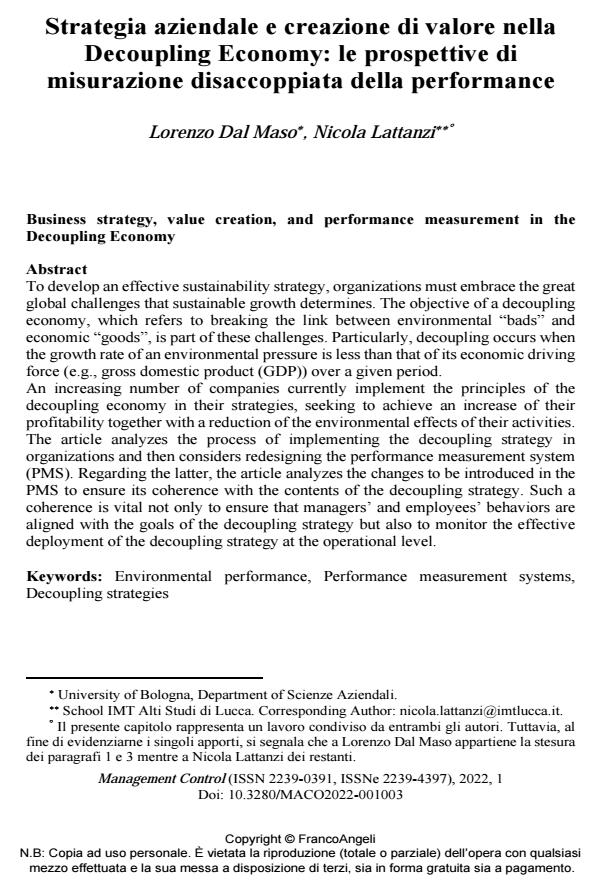Business strategy, value creation, and performance measurement in the Decoupling Economy
Journal title MANAGEMENT CONTROL
Author/s Lorenzo Dal Maso, Nicola Lattanzi
Publishing Year 2022 Issue 2022/1
Language Italian Pages 14 P. 31-44 File size 272 KB
DOI 10.3280/MACO2022-001003
DOI is like a bar code for intellectual property: to have more infomation
click here
Below, you can see the article first page
If you want to buy this article in PDF format, you can do it, following the instructions to buy download credits

FrancoAngeli is member of Publishers International Linking Association, Inc (PILA), a not-for-profit association which run the CrossRef service enabling links to and from online scholarly content.
To develop an effective sustainability strategy, organizations must embrace the great global challenges that sustainable growth determines. The objective of a decoupling economy, which refers to breaking the link between environmental "bads" and economic "goods", is part of these challenges. Particularly, decoupling occurs when the growth rate of an environmental pressure is less than that of its economic driving force (e.g., gross domestic product (GDP)) over a given period. An increasing number of companies currently implement the principles of the decoupling economy in their strategies, seeking to achieve an increase of their profitability together with a reduction of the environmental effects of their activities. The article analyzes the process of implementing the decoupling strategy in organizations and then considers redesigning the performance measurement system (PMS). Regarding the latter, the article analyzes the changes to be introduced in the PMS to ensure its coherence with the contents of the decoupling strategy. Such a coherence is vital not only to ensure that managers’ and employees’ behaviors are aligned with the goals of the decoupling strategy but also to monitor the effective deployment of the decoupling strategy at the operational level.
Keywords: Environmental performance, Performance measurement systems, Decoupling strategies
- L'integrazione della sostenibilità ambientale nei sistemi di controllo e gestione delle imprese: evidenze dal settore energetico italiano Salvatore Madonna, Greta Cestari, Francesca Giuliani, in MANAGEMENT CONTROL 1/2024 pp.39
DOI: 10.3280/MACO2024-001003 - Performance management systems for sustainability in SMEs: An interventionist approach Alessandra Buonasera, Guido Noto, Carlo Vermiglio, in MANAGEMENT CONTROL 3/2024 pp.39
DOI: 10.3280/MACO2024-003003
Lorenzo Dal Maso, Nicola Lattanzi, Strategia aziendale e creazione di valore nella Decoupling Economy: le prospettive di misurazione disaccoppiata della performance in "MANAGEMENT CONTROL" 1/2022, pp 31-44, DOI: 10.3280/MACO2022-001003